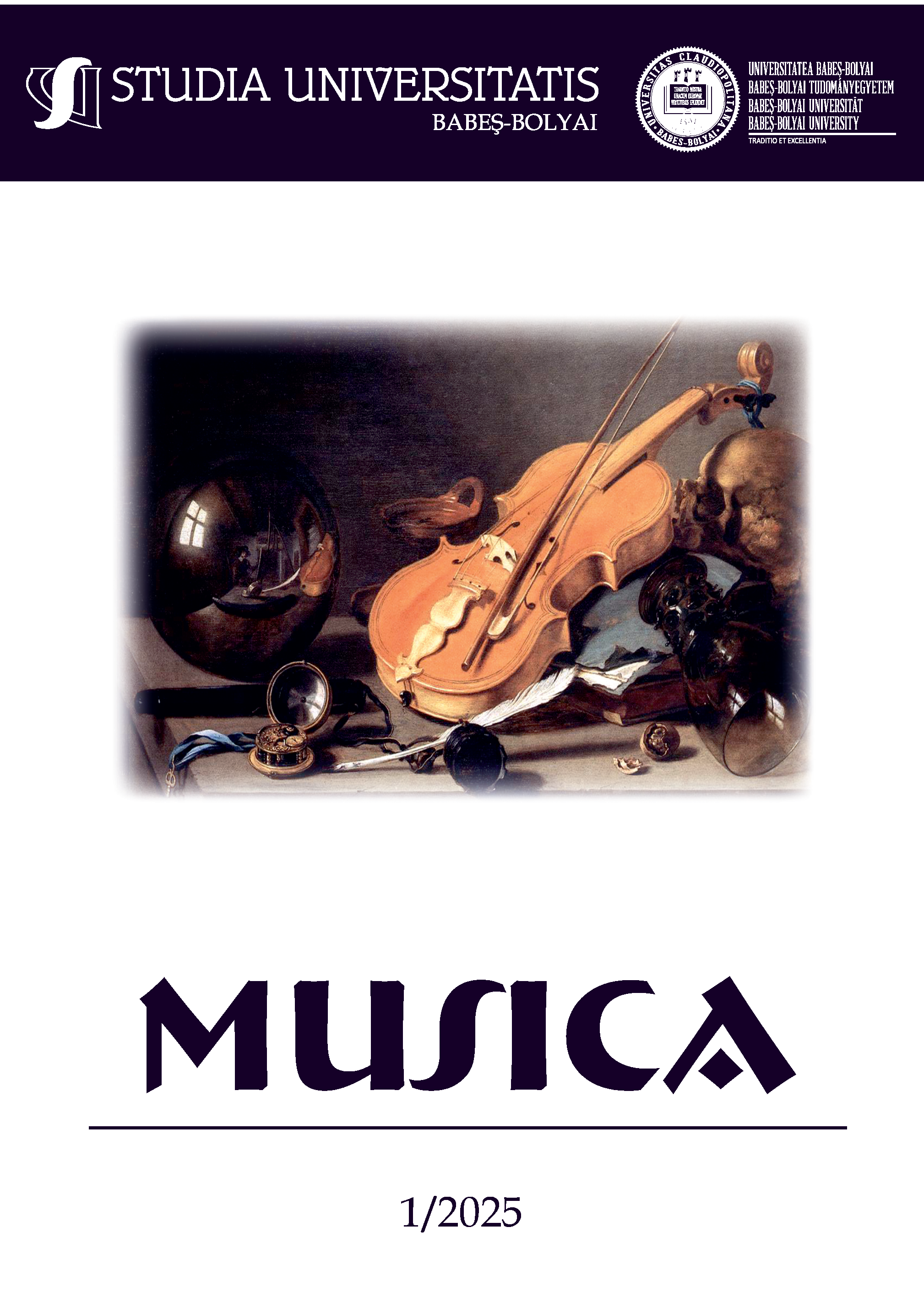The Transfer of Information as a Principle of Musical Creation: Between Data and Meaning (I)
DOI:
https://doi.org/10.24193/subbmusica.2025.1.18Keywords:
Informational Transfer, Musical Communication, Composer - Performer - Audience Relationship, Interpretation and Meaning, Informational Transfer Device (ITD), Contextual RecontextualizationAbstract
This study explores how information transfer shapes contemporary musical creation. It examines the dynamic relationship between composer, performer, and audience, emphasizing that music is not merely a technical process but a continuous exchange of meaning. The study highlights Gustav Mahler’s Symphony No. 1 and Rautavaara’s Cantus Arcticus as examples of reinterpretation and contextual transformation. It introduces the Informational Transfer Device (ITD) concept, illustrating how musical ideas evolve through multiple agents. The paper also addresses the ontological role of information in music, drawing on Aristotelian causality and modern information theory. Furthermore, it explores perception, interpretation, and cultural context in musical reception, comparing these mechanisms to the Kuleshov Effect in cinematography. Finally, the study offers practical applications for composers and performers, demonstrating how informational transfer principles can enhance expressivity, audience engagement, and interdisciplinary artistic collaborations.
References
1. Adami, Christoph. “What Is Information?” The Royal Society Publishing, Philosophical Transactions of the Royal Society A, vol. 374, no. 2063, 2017, http://rsta.royalsocietypublishing.org/content/374/2063/20150230. [Accessed 22 May 2017.]
2. Adriaans, Pieter. “Information.” The Stanford Encyclopedia of Philosophy.
3. Barenboim, Daniel. Everything Is Connected: The Power of Music. Phoenix, 2009.
4. Barham, Jeremy. The Cambridge Companion to Mahler. Cambridge University Press, 2007, p. 87.
5. Becker, Kate. “Is Information Fundamental?” PBS Article on Physics and Information Theory.
6. Berenson, Nigel, Catherine Collin, Joannah Ginsburg, Merrin Lazyian, and Marcus Weeks. Psychology: Fundamental Ideas. Litera Publishing, 2015.
7. Berio, Luciano. Luciano Berio: Two Interviews. Marion Boyars, 1985.
8. Berliner, Paul F. Thinking in Jazz: The Infinite Art of Improvisation. University of Chicago Press, 1994, p. 63.
9. Blaga, Lucian. Aphorisms. Humanitas, 2008.
10. Calvin, William H. How the Brain Thinks? Humanitas, 2010.
11. Corazza, Giovanni Emanuele, and Sergio Agnoli. Multidisciplinary Contribution to the Science of Creative Thinking. Springer, 2016.
12. Csikszentmihályi, Mihály. Flow: The Psychology of Happiness. Publica, 2015.
13. Dediu, Dan. The 9 “I”s or How We Compose. Didactic and Pedagogical Publishing House, 2012.
14. Dediu, Dan. Radicalization and Guerilla. National University of Music Publishing House, 2000.
15. Eco, Umberto. From the Tree to the Labyrinth. Polirom, 2009.
16. Foucault, Michel. Power/Knowledge: Selected Interviews and Other Writings 1972-1977. Pantheon Books, 1980.
17. Gann, Kyle. No Such Thing as Silence: John Cage’s 4’33’’. Yale University Press, 2010, p. 211.
18. Hennig, Boris. Aristotle’s Four Causes. Peter Lang, 2019, p. 45.
19. Heidegger, Martin. The Origin of the Work of Art. Humanitas, 2011.
20. Iorgulescu, Adrian. Musical Time: Matter and Metaphor. Muzicală Publishing House, 1988.
21. Kahneman, Daniel. Thinking, Fast and Slow. Publica, 2015.
22. Lanza, Robert, and Bob Berman. Biocentrism: How Life and Consciousness Are the Key to Understanding the True Nature of the Universe. BenBella Books, 2009.
23. Lehmann, Christian. The Key to Music’s Genetics. Thames River Press, 2014.
24. Sandu-Dediu, Valentina. Choices, Attitudes, Affects: On Style and Rhetoric in Music. Didactic and Pedagogical Publishing House, 2010.
25. Stravinsky, Igor. Poetics of Music. Harvard University Press, 1947.
26. Turner, Charles W. Xenakis in America. One Block Avenue Tappan, 2014.
27. Vieru, Anatol. The Book of Modes. Muzicală Publishing House, 1980.
28. Zlate, Mielu. The Psychology of Cognitive Mechanisms. 2nd ed., Polirom, 2006.
Downloads
Published
How to Cite
Issue
Section
License
Copyright (c) 2025 Studia Universitatis Babeş-Bolyai Musica

This work is licensed under a Creative Commons Attribution-NonCommercial-NoDerivatives 4.0 International License.



